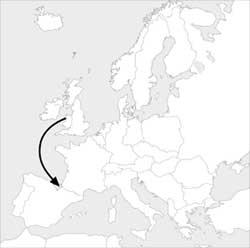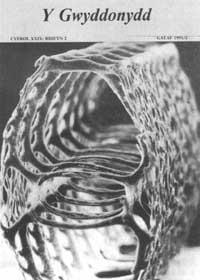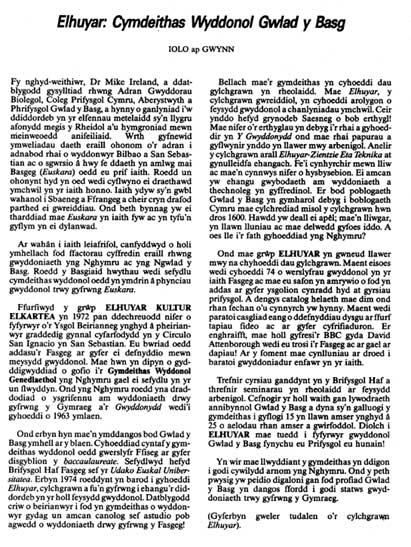From Welsh to Euskal Herria

In early May we had among us the Welsh biologist Iolo ap Gwynn. The objective of the visit was to know the scientific situation of linguistic normalization in the Basque Country. That is, to see to what extent Basque is used to transmit scientific knowledge in different places (university, school, media, etc. ). This initiative has been organized by the Faculty of Sciences of the University of the Basque Country and the Basque Summer University, in collaboration with the British Council.
Iolo ap Gwynn is a biologist and university professor. He is also a member of the Welsh Academy of Sciences (where he works in galleys) and next year he will be director of the scientific journal published in galleys.

Iolo ap Gwynn offered three lectures at the Faculty of Sciences of Leila to explain the history and linguistic situation of Wales. It should be noted that the linguistic situations in Euskal Herria and Wales are very similar if we look at the number and percentage of speakers, and in addition, the two accompany us in large and strong languages. Iolo held meetings with university professors such as the Vice-Rector of Euskera Pello Salaburu. In addition, he had the opportunity to know in depth and live different institutions and experiences such as Elhuyar, Euskadi irratia, Euskaldunon Egunkaria, UEU or UZEI.
For our part, we highly appreciate the speech we had with Iolo ap Gwynn. On the one hand, we explain what we do in Elhuyar (about organization, financing, distribution, etc. of the magazine that was very interested Iolo) and on the other hand, he taught us what is done in Wales. Among the material it provides, some books and television programs seemed to us the most interesting. As for television, he told us that the viewer had the option to watch gallery shows with English subtitles or not. On the other hand, it can be of great interest from the point of view of the Basque Country, a network of local magazines throughout Wales.
Therefore, looking forward, we hope to be the first step in a fruitful relationship. And in Wales the situation from the standpoint of linguistic normalization is worse than in Euskal Herria, but there is something to learn.

Science in France calling for language policy! The growing tendency to become an international English communication tool of the scientific community has generated concern among French speakers living in a more relaxed situation than ours. This is not a new issue in the world of francophonie, but a recent case has raised the gaps in the scientific world. Claude Roux, a licensee working at the Mediterranean Institute of Ecology and Paleoecology of the Faculty of Science and Technology of Saint-Jerome (Marseille) has caused the storm. He was presented for two years as head of research at the CNRS (Centre Nationale de la Recherche Scientifique). Neither in the first nor in the second has obtained square. Following this year's second refusal, a jury member says: “Your curriculum is very good, but you have no choice, you haven’t published it in English.” This was not the only occasion when pressure for the use of English was detected. Roux himself said that when in February the chairman of the CNRS committee visited his laboratory he recommended that he “meet with an English-speaking researcher for publications”, even though his contribution was merely a translator. In 1989 a similar controversy arose when the Pasteur Institute decided to give its publications in English. Among the opinions that appeared then, many already said that it was too late, since in the scientific community the tendency was evident to use English. The President of the Roux Jury, Robert Barbault, of the VI University of Paris, considers reasonable the importance that the CNRS gives to English. “The work of researchers is not only research, but also the dissemination of discoveries,” he says. “This diffusion is much more effective if done through widely disseminated magazines in English. The publication in English, in addition to promoting French science, attracts interest in other publications in French. Asking a candidate who wants to be a head of research to try to publish in English is just a logical consequence.” The Superior Council of Frankofonia has assumed the case of Roux. The response sent to it mentions “cultural alienation” and adds: “We certainly don’t need English to participate in the progress of science.” Despite Roux's case, some French researchers believe that the government should make a clear and coherent policy in favor of using French in research. Marcel Barbero of the Faculty of Sciences of Marseilles told President Mitterand: “We cannot allow the management teams of national research institutions not to accept French as a language of communication and international expression of science, without attending to the statements of heads of state, governments and ministers.” In the words of Barbero, the CNRS does not subsidize scientific journals in French and holds congresses in English in France. Barbault, for his part, believes that the CNRS does so “because of its greater closeness to scientific reality”. It is evident that in the administration things have begun to move. Scientific and educational works published in French by decision of the Superior Council should be taken into account when evaluating researchers. They also explained their intention to create a multilingual European magazine with references. In this magazine it is expected that the bulk of articles will appear in French and it seems that the project has the approval of the European Community. However, those who are so concerned about the situation of French hardly remember the languages dominated by French: Corsa, Breton, Provencal, Occitan, Alsazi, Gascon, Catalan or Basque, for example. They should know that in France they have no official status, neither in research, nor in administration, nor in education, nor in anything, but they do not talk about it. In Txirrita’s words, “we don’t want the spirit like ourselves.” |
Buletina
Bidali zure helbide elektronikoa eta jaso asteroko buletina zure sarrera-ontzian











